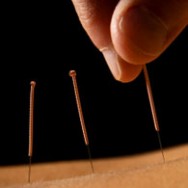Originally published at http://www.doctoroz.com
By Jamie Starkey, LAc
Over the weekend, I found myself at a social gathering in which there was a multitude of smokers. Typically, smokers congregate outside to light up, incredibly brave as they endure the bone-chilling temperatures that Clevelanders have all come to love. But at this social gathering, there was no need to step outside for a smoke, certainly not when the host was lighting up indoors as well! Much to my dismay, I found myself dodging the secondhand smoke, but to no avail.
I spent the majority of my time outside in the winter elements gasping for fresh air – odd how the tables turned. Suffice it to say, my night was an early one and I retired home with the smell of cigarettes all over my hair, skin and clothes. This experience comes at an ironic time as my schedule at the hospital books up with patients who made New Year’s resolutions to kick the habit and battle smoking/tobacco addiction once and for all.
And for good reason:
* With each inhalation of a cigarette, you breath in over 4,000 chemicals, including but certainly not limited to arsenic, ammonia, acetone, ammonium bromide, benzene, carbon monoxide, cadmium, cyanide, DDT, formaldehyde, lead, mercury, nickel, hydrogen cyanide, and hydrogen sulfide, in addition to at least 50 cancer-causing agents.
* According to the Centers for Disease Control, cigarette smoking causes death: nearly 443,000 deaths per year (1 in 5 deaths) to be exact. This is more than HIV, illegal drug use, alcohol use, motor vehicle injuries, suicides and murders combined.
* Smoking increases the risk of coronary artery disease, stroke, lung cancer, chronic obstructive lung disease, abdominal aortic aneurysm, infertility, premature delivery, stillbirth, low birth weight, and sudden infant death syndrome.
* Cigarettes cause cancer: acute myeloid leukemia, bladder, cervical, esophageal, kidney, larynx, lung, oral (mouth), and stomach cancers.
* Cigarette smoking is associated with lower bone density in postmenopausal women, and increases the risk of hip fractures in women.
Despite all the facts regarding the ill effects of smoking, people continue to smoke because of the addictive nature of nicotine, the primary chemical in tobacco. Within 10 to 20 seconds of inhaling on a cigarette, nicotine will reach your brain, causing a huge surge of dopamine to be released. Dopamine is one of several “feel good” chemicals your brain produces to make you feel pleasure. Nicotine is such a potent drug that one drop of pure nicotine can cause you to go into respiratory failure (stop breathing), paralysis and death.
What can acupuncture do to assist in quitting smoking? Acupuncturists are trained to address addictions, especially nicotine addiction, following the principles of Traditional Chinese Medicine. We assess the addiction from several perspectives, inclusive of the physical, mental and emotional addiction. There are many acupuncturists who utilize a technique where fine needles are inserted into a set of five acupuncture points on the ear (auricular acupuncture), as promoted by The National Acupuncture Detoxification Association (NADA), a not-for-profit organization who teaches and endorses this acupuncture detoxification protocol. You may even be sent home with small beads placed on the ear using adhesive tape, that when stimulated, can continue to help curb withdrawal symptoms (an application of auricular acupressure). In general, expect frequency of visits to be several times per week for the first week or two (recommendations vary per acupuncturist and patient’s condition). Our goal in the treatment plan is to support patients through the acute phase of withdrawal, improving your success at kicking the nicotine habit. Commonly, patients experience a decrease in cravings, changes in sensory perception as the taste and smell of cigarettes becomes intolerable, and an increased state of calm and relaxation.
If you have ever attempted to quit, you know there are multiple withdrawal symptoms that one can experience, including: insomnia, fatigue, feeling jittering, cough, tightness in the chest, dry mouth, constipation, irritability, depression, anxiousness and lack of concentration. As an acupuncturist, I routinely address these issues independently, and improvements in such symptoms are commonly experienced as side benefits by patients. In the scientific community, there have been insightful findings on acupuncture’s complex mechanism of action, offering explanation of why this ancient treatment works. Research supports acupuncture’s role in influencing the various aspects of the nervous system, thereby modulating things like your gastrointestinal system, heart rate, stress response and mood.
In 2011, the Bureau of Justice Assistance (BJA), a subsidiary of the US Department of Justice, in collaboration with the American University, evaluated the effectiveness of acupuncture as an adjunct to substance abuse treatment. This initiative ensued as a result of many drug courts using acupuncture as an adjunct to the substance abuse treatments provided to drug court participants. In the BJA review of the literature, they determined a number of acupuncture studies demonstrated reduced cravings and symptoms of withdrawal when coupled with conventional treatment plans.
A recent Cochrane Review assessed various randomized control trials looking at acupuncture and related interventions for smoking cessation. Due to flaws in methodological designs and bias, they were unable to firmly conclude acupuncture was a viable stand alone treatment plan for tobacco cessation but ended with “… acupuncture may be better than doing nothing, at least in the short term; and there is not enough evidence to dismiss the possibility that acupuncture might have an effect greater than placebo.” Despite the flaws in the formal research design, it’s hard to overlook the empirical outcomes as thousands of people have found success with tobacco cessation through the aid of acupuncture treatments.
I recently gave a lecture about tobacco cessation, and as I laid out the facts about nicotine and tobacco addiction, I could not help but appreciate the strength of the human spirit. When one decides to finally quit, the battle against the addictive quality of nicotine requires the utmost determination.
Using a combination of therapies like hypnosis, acupuncture and pharmaceutical approaches to address the mental, emotional and physiological aspect of the addiction oftentimes yields the best results. Ultimately, tobacco addiction is a personal one, as is the journey to kicking the habit. It does not matter what road is taken, but that you reach your final destination of being tobacco-free!!




